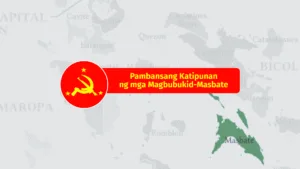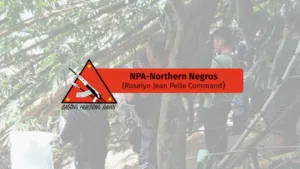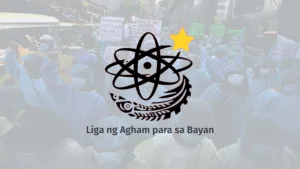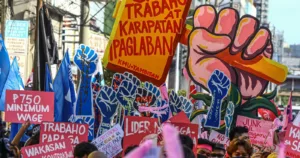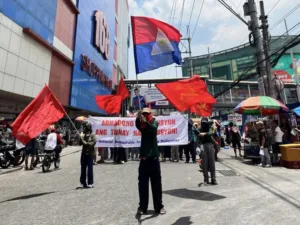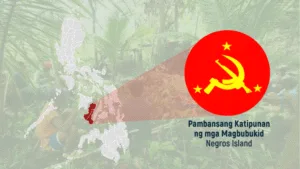Communist Party of the Philippines
The Communist Party of the Philippines (CPP) joins the Filipino people in marking the first anniversary of supertyphoon Yolanda.
The CPP joins the survivors of the tragedy in remembering their relatives, friends and loved ones who perished in their scores of thousands during the storm. Millions lost their homes, their jobs and livelihood.
Criminal neglect and corruption of the Aquino regime
The CPP joins the Yolanda survivors in demanding justice over the criminal neglect of the ruling Aquino regime. They demand accountability of the ruling regime for failing to carry out a mass evacuation of people in the path of the supertyphoon (recall that days later, Vietnam carried out the evacuation of more than a million people in preparation for supertyphoon Haiyan).
The Aquino regime acted at a snail’s pace in the face of the widespread destruction of lives and property. Its relief operations in the worst hit cities and towns like Tacloban, Palo, Guiuan and Basey arrived only five days after the typhoon. In most of the devastated areas, help from government agencies never arrived.
One year since, one and a half million people continue to live in temporary or makeshift shelters, with the Aquino government helping build fewer than 400 houses. Only 1% of nearly 20,000 damaged schools have been repaired, 8% of damaged bridges, 14% of public roads and 20% of public markets.
The Aquino regime has refused to heed the demand for a P40,000 cash assistance for people who have lost everything to enable them to restart their lives. It has imposed the “no-build-zone” policy to drive people away from their land and pave the way for the big comprador commercial operations and big business establishments.
The people denounce the corruption in the Aquino regime’s relief work. International donations coursed through government agencies have been pilfered by corrupt officials. The government built substandard temporary shelters with bloated budgets.
Relief materials and livelihood assistance from people’s organizations and movements, as well as local and international relief agencies have been more palpable than those extended by the government.
The democratic movement of disaster survivors
The survivors of typhoon Yolanda are experiencing the same incompetence and negligence suffered by the survivors of other disasters such as typhoon Sendong of 2011, typhoon Pablo of 2012, the Habagat floods of 2013 , the AFP mass bombings in Zamboanga in 2013 and the Bohol earthquake of the same year.
The CPP urges all survivors of all past disasters who have been unjustly abandoned by the reactionary regime to unite. The CPP fully supports their demands for immediate relief and aid for rehabilitation, and their protest actions and clamor for justice.
Disaster survivors are victims of a grave injustice. They are victims of the Aquino regime’s failure to put into place sufficient disaster-prevention measures. They are victims of corruption in so-called welfare agencies. They are victims of the oppressive and backward system that fails to provide them jobs, just wages and sufficient livelihood. It is the oppressed and exploited classes who suffer grave economic hardships after any disaster.
The struggle of the disaster survivors forms a growing aspect of the national democratic mass movement as the ruling semicolonial and semifeudal system continues to deteriorate rapidly.
Amid the crisis of the world capitalist system, the ruling classes of big bourgeois compradors and big landlords and foreign big capitalists become ever more rapacious in the exploitation and plunder of the remaining land, forest, mineral and marine resources of the semicolonies.
There is anarchy in urban infrastructure as the big oligarchs race against each other in building more shopping malls and office space in increasingly overcrowded districts. Urban poor and rural communities become more vulnerable to disasters such as floods, mudflows and sea surges.
The CPP supports the efforts of all disaster survivors to unite and demand accountability from the ruling Aquino regime. It is just for them to seek redress for the the Aquino regime’s criminal culpability and its failure to carry out measures to protect the people from calamities.
It is just for them to demand an end to budgetary cutbacks for disaster preparedness and response. It is right for them to demand social guarantees in the form of sufficient emergency food and shelter, financial assistance and debt cancellation as insurance against failures of government to prevent calamities from turning into disasters.
They stand on firm ground in calling for the ouster of Aquino and in rising up in a surge of protest.
Confronting disasters through people’s war
Before Yolanda swept through the Philippines, the CPP enjoined all revolutionary forces in areas along the supertyphoon’s path to mobilize the people and bring them to safer ground. Attending to the people’s well-being, NPA units and people’s militias organized a mass evacuation, giving priority to young children and the elderly. In some areas, villagers were brought to caves to secure their lives. Militias, acting as civil defense units, helped secure the people’s homes, work animals and other belongings.
After the storm, the Central Committee of the CPP (CPP-CC) declared a ceasefire in the areas devastated by the supertyphoon. Regional committees of the CPP and commands of the NPA issued similar directives. The declaration was in effect for up to 45 days in the affected areas, and extended up to 60 days in Eastern Visayas. Thus, the NPA units and people’s militias in these areas were able to attend to the welfare of the people who survived the storm but were confronting the problem of food shortages and the threat of hunger in the medium-term.
NPA units, local party branches and mass organizations immediately mobilized the people in order to assess the damage and plan out an appropriate course of action to address urgent needs. A communication and transportation network was immediately established in order to seek relief goods and other material assistance from local mass organizations as well as international and local relief agencies. Financial aid and material support from NDFP-Mindanao were among the first to arrive.
The NPA, local peasant associations and mass organizations trained their attention to mobilizing the people to confront the disaster and threats of hunger by planning out campaigns for land reform to address their urgent socio-economic problems. In areas where landlord power is absent or weakened, peasant associations campaigned to establish work collectives, communal farms and production plots supported by funds from the people’s government. The people were encouraged to plant vegetables to provide food in the short-term. They also planted root crops both for food and cash. Where landlord power still holds sway, the peasant masses carried out antifeudal struggles to demand that landlords suspend or reduce land rent and cancel usurious debts.
In collectively confronting the devastation, addressing their needs, managing production, administering cooperatives and implementing policies, the local mass organizations exercised democratic initiative and self-governance. Such efforts are direct preparations for the establishment of local organs of political power where they do not yet exist or the expansion of people’s governmental bodies where they have already been established.
The post-Yolanda mass movement of thousands of peasants in the guerrilla zone areas have set the conditions for the rapid expansion of peasant associations and mass organizations and the rapid increase in the number of barrio revolutionary committees and the establishment of inter-barrio revolutionary committees in the next coming months.
These conditions exceedingly favorable for the rapid expansion of people’s militia units and NPA units. Even now, scores of youth activists are lining up daily to join the NPA in order to serve the people.
The NPA must continue to wage revolutionary armed struggle to frustrate the Aquino regime’s campaign to destroy the people’s democratic initiatives. They must launch tactical offensives against the AFP units of the 9th and 3rd ID that continue to carry out campaigns of suppression especially in the guerrilla zone areas.
By advancing people’s war, the people and their revolutionary forces have been able to address and overcome the devastation brought about by supertyphoon Yolanda and the Aquino regime’s criminal neglect. They are ready to confront even greater challenges in the future as the people’s war further advances nationwide.


